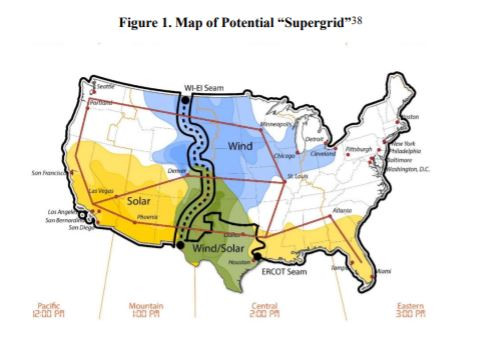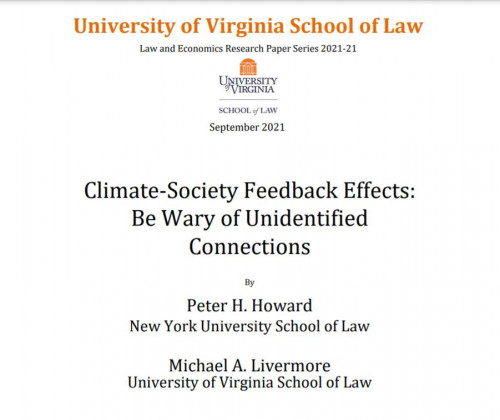-
Comments to EPA on New Clean Car Standards
We submitted comments on the Environmental Protection Agency’s (“EPA”) notice of proposed rulemaking, Revised 2023 and Later Model Year Light-Duty Vehicle Greenhouse Gas Emissions Standards. Our comment urged EPA to: select the regulatory alternative that will maximize net social welfare and promote distributional justice; rely on legislative and regulatory history to help justify its aproach to lead time; and improve its modeling to more fully capture benefits of stronger standards.
We also submitted joint comments with a coalition of other environmental groups on EPA's use of the social cost of carbon (SCC) in its proposed regulation, recommending that the agency expand its justification its discount rates and inclusion of global damages in the SCC, and affirm that the SCC is a lower bound of projected climate impacts.
-
Comments to Michigan PSC on Extreme Weather Planning
In the aftermath of summer storms that resulted in widespread and prolonged power outages, Michigan's Public Service Commission requested comments on whether utilities should continue to rely exclusively on historical data when planning for extreme events. In comments filed jointly with the Sabin Center for Climate Change Law at Columbia Law School, and the Initiative for Climate Risk and Resilience Law, Policy Integrity suggested processes and tools that the Commission should direct utilities to use to identify and mitigate vulnerabilities to the impacts of extreme weather and climate change impacts more generally.
-
Comments to NHTSA on Rescinding CAFE Penalties Interim Final Rule
The National Highway Traffic Safety Administration ("NHTSA") sets corporate average fuel economy ("CAFE") standards for light-duty vehicles, and penalizes automobile manufacturers who fail to meet applicable standards. In January 2021, NHTSA issued an Interim Final Rule repealing the inflation-adjusted penalty increase for Model Years 2019-2021, which we commented was untimely and disregarded critical environmental harms.
In August 2021, NHTSA proposed to rescind the Interim Final Rule. We filed comments supporting the proposal for complying with inflation-adjustment obligations, driving fuel savings, and reducing pollution.
-
Comments to FERC on Alberta Xpress Project
We filed a comment letter with the Federal Energy Regulatory Commission (FERC) regarding their continued failures to meaningfully assess the climate impacts of natural gas infrastructure projects, this time regarding the Alberta Xpress Project DEIS. The project will contribute up to 3.31 million metric tons of carbon dioxide equivalent per year in operational and downstream emissions, and it could cause at least $3.33 billion in climate costs over the twenty-one-year precedent agreement underlying it.
-
Testimony in Michigan’s Line 5 Case
Policy Integrity's Economics Director Peter Howard joined climate scientists and economic experts in written testimony to the Michigan Public Service Commission (MPSC) about the significance of excessive greenhouse gas emissions that would be generated if Enbridge’s Line 5 tunnel siting permit is approved. Howard explained that “the Proposed Project will generate a present value of $41 billion (in 2020 dollars) or more in net monetized climate costs from 2027 to 2070 as compared to the no-action alternative – in other words, the Proposed Project will generate average annual monetized climate costs of approximately $1 billion each year over this period, plus significant unmonetized climate effects and other unquantified pollution costs to human health and the environment.”
-
Comments to FERC on Joint Federal-State Task Force on Transmission
We submitted comments to FERC today providing suggested topics for the first meeting of the joint federal-state task force on transmission. Our comments respond to a request for topics related to barriers inhibiting more efficient and effective transmission planning and deployment. We identify two barriers that the task force should discuss -- jurisdictional issues related to transmission siting and the lack of a standardized cost benefit analysis rubric for transmission projects.
-
Building a New Grid without New Legislation: A Path to Revitalizing Federal Transmission Authorities
Published Ecology Law Quarterly
In the absence of legislation, critical long-distance transmission can be developed by applying existing federal legal authorities. A number of important regulatory and commercial measures have been proposed, including streamlining transmission planning, upgrading existing transmission system components, putting transmission lines underground, and using existing rights-of-way from highways and railroads. Even if these solutions are adopted, however, state siting requirements may prove an important obstacle to developing an efficient, national transmission grid. So, this paper examines legal authorities already available to the Department of Energy and the Federal Energy Regulatory Commission to develop the interstate transmission capacity crucial to the energy transition.
-
Comments to FERC on Evangeline Pass Expansion Project
We filed a comment letter with the Federal Energy Regulatory Commission (FERC) regarding their continued failures to meaningfully assess the climate impacts of natural gas infrastructure projects, this time regarding the Evangeline Pass Expansion Project EIS. Two companies have requested authorization to construct and operate a new pipeline, compressor stations and meter stations in Louisiana and Mississippi, which will be used to transport up to 1,100,000 dekatherms per day to an LNG facility for export. -
Climate-Society Feedback Effects
Be Wary of Unidentified Connections
To ensure policies are based on accurate predictions of climate impacts, it is critical to understand social-ecological system (SES) feedbacks, including how humans change the climate by reacting to a changing climate. Building on recent scholarly work on the topic, this article describes SES interactions and how they can be incorporated into climate policy tools such as the social cost of carbon. The article then proposes a research agenda for the identification, quantification, and integration of climate-society feedbacks into social-cost integrated assessment models (SC-IAMs).
-
Comments to EPA and USACE on Clean Water Protections
The Environmental Protection Agency (EPA) and Army Corps of Engineers (USACE) have expressed the intention to repeal the Navigable Waters Protection Rule, which removed critical federal protections on many waterways and has been vacated by a federal court for violating the Clean Water Act. In comments filed to the agencies, we welcome the decision to replace the rule but encourage strong justification for reversing course and point to flaws in the economic analysis for the earlier rule that can support the case for replacing it.
We previously commented on the rule and its flawed economic justification, published a report on its concealed costs, and filed amicus briefs in court cases that challenged it.





